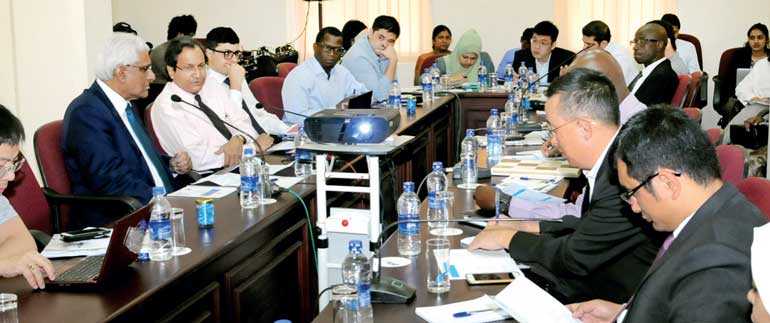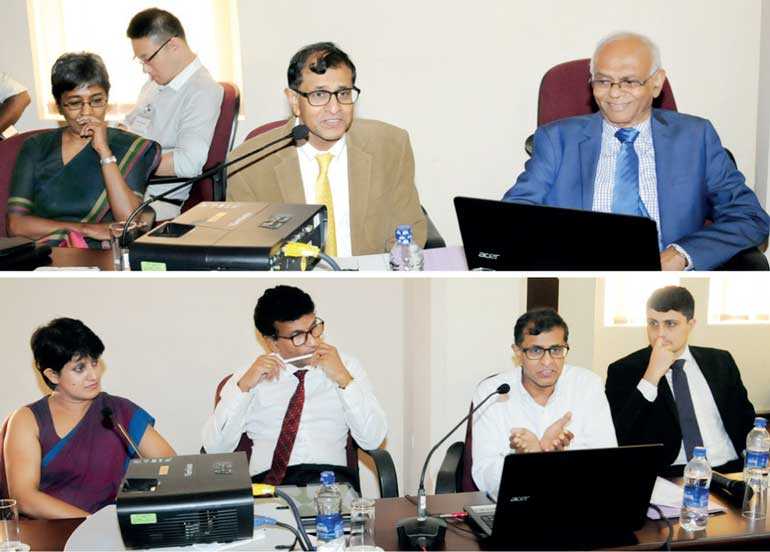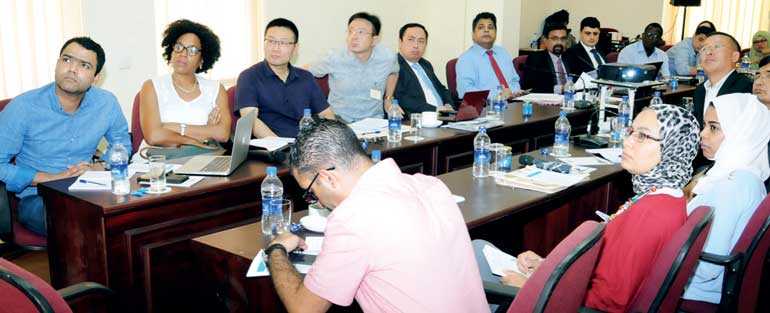Sunday Feb 22, 2026
Sunday Feb 22, 2026
Monday, 22 October 2018 00:00 - - {{hitsCtrl.values.hits}}

Central Bank Governor Dr. Indrajit Coomaraswamy has observed that while Sri Lanka faces some difficulties due to the bunching up of debt payments, Sri Lanka had never missed a payment, was not in economic danger, and that the situation can be managed. He noted that recent Sri Lankan policies had improved the architecture for liability management and provided more headroom and stability in managing external debt obligations. The Governor emphasised enhancing Sri Lanka’s macroeconomic fundamentals by addressing challenges such as the budget deficit, inflation and an overvalued currency as well as continuing with an export-led growth strategy to transform the economy.
The Governor made these observations while delivering the key note address to a group of mid-career capital based diplomats representing over 23 countries across Asia, Africa, the Middle East, Latin America, and Australasia who are presently in Sri Lanka, during the Economic Diplomacy segment of the session conducted at the Lakshman Kadirgamar Institute of International Relations and Strategic Studies (LKI). The two week visit, as part of the ‘Sri Lanka Foreign Policy and Economic Diplomacy Dialogue’ is organised by the Ministry of Foreign Affairs of Sri Lanka (MFA), in collaboration with the Bandaranaike International Diplomatic Training Institute (BIDTI) and the LKI. The Foreign Ministry’s Additional Secretary for Economic Affairs and Trade Ravinatha Aryasinha chaired the session.
The program at the LKI sought to provide a 360° overview of Sri Lanka’s economy, trade, investment, and tourism, and to engage diverse views on Sri Lanka’s strategic positioning in the global economy as the Indian Ocean’s trading hub. Representatives of the Ministry of Development Strategies and International Trade (MODSIT) and the Department of Commerce (DOC), as well as Heads of the Export Development Board (EDB), the Board of Investment (BOI), the Sri Lankan Tourism Promotion Authority (SLTDA), the Sri Lanka Foreign Employment Bureau, the Tea Board, the Megapolis Ministry, the Sri Lanka Ports Authority, and the Colombo International Financial Centre (Port City) Project, also made presentations. They were also briefed on the outcome of the recently concluded track 1.5 conference on the ‘Indian Ocean: Defining Our Future’, held in Colombo on 11-12 October, to discuss issues related to regional economic development and maritime security.

Sri Lankan brands with global presence, top entrepreneurs, and Captains of Industry who participated in the dialogue showcased how Sri Lanka’s business-friendly domestic environment has enabled local brands and entrepreneurs to flourish. These panels, moderated by Director General/ Economic Affairs (Multilateral) Saroja Sirisena, included John Keells, Jetwing, Dilmah, Siddhalepa and Spa Ceylon. Sri Lanka’s IT industry, which is recognised as a ‘hidden gem’ for IT and outsourcing, was also presented under its brand ‘Island of Ingenuity’. Panels comprised members of the private sector including Jetwing Chairman Hiran Cooray, Hettigoda Industries CEO Asoka Hettigoda; Dilmah Ceylon Tea Company Director Malik J. Fernando; Virtusa Executive Vice President Madu Ratnayake; JKH Cinnamon Hotels Vice President Dileep Mudadeniya, IronOne CEO Lakmini Wijesundera, SLASSCOM President Jeevan Gnanam, Hatton National Bank Managing Director Jonathan Alles, and Spa Ceylon Luxury Ayurveda Director and Co-Founder Shalin Balasuriya.
Two panels were moderated by LKI Executive Director Dr. Ganeshan Wignaraja. The first included former Central Bank Deputy Governor Dr. W. A. Wijewardena; Institute of Policy Studies Executive Director Dr. Dushni Weerakoon; Finance Ministry Economic Advisor Deshal De Mel; and Daily Financial Times Editor Nisthar Cassim. They discussed the outlook and challenges for the Sri Lankan economy against a tepid global economic environment beset by various risks including the US-China trade war, a slowdown in the Eurozone and Japan and a tightening of US interest rates. It was emphasised that Sri Lanka’s economic prosperity can be achieved by tapping into global trade, undertaking economic reforms, forging trade agreements, and transforming the economy towards global value chains and services. The second panel included Finance Ministry Public Private Sector Unit Chairman Thilan Wijesinghe; Sri Lanka Tourism Development Authority Chairman Kavan Ratnayaka; Verité Research Ltd. Research Director Subhashini Abeysinghe, at; and LKI Research Fellow Adam Collins. They explored opportunities and challenges related to Sri Lanka‘s development as a hub in the region. Issues discussed included the competitiveness of Sri Lanka’s ports and logistics, the experiences of Dubai and Singapore, public private partnerships for infrastructure financing, policies for attracting foreign investment, and tourism promotion strategies.
Officials from Afghanistan, Australia, Bangladesh, Bhutan, Brazil, China, Cuba, Egypt, India, Kenya, Malaysia, Maldives, Mongolia, Myanmar, Nepal, Pakistan, Palestine, Senegal, Singapore, South Africa, Thailand, United Arab Emirates and Vietnam, are attending these sessions. During the sessions, there was a useful sharing of experiences of countries of the visiting diplomats that might have relevance to Sri Lanka and the region, and also insights from Sri Lanka that could be emulated in their countries.
The diplomats also made study visits to the Port City, the Colombo Harbour, the Nanotechnology Institute in Homagama, and the University of Moratuwa. The participants are also scheduled to visit the Brandix Green Plant, Gannoruwa Agriculture Department Spice Park, a tea plantation, Kandy, Polonnaruwa, Sigiriya and Galle, as well as Passikudah and the Minneriya Nature Reserve.
